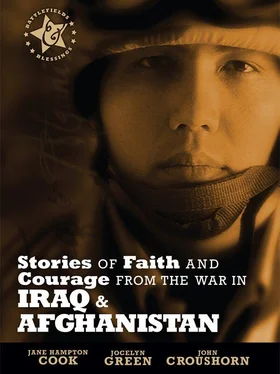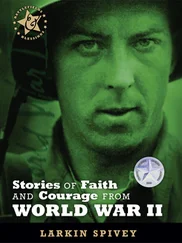Then we heard screaming. A mortar round hit a trailer three buildings down and one over from us. We had sandbags all around our trailers about waist high to limit indirect fire casualties. This round landed about chest high through the wall and into a young man’s bunk bed. Just before the round landed, the soldier had gotten out of bed to go and use the bathroom. He was sixty-five feet away using the bathroom when the round came in. His roommate was sleeping in the bed on the other side of the trailer and he was peppered by shrapnel. It didn’t kill him, but it wounded him pretty bad. He was the one doing the screaming.
It was weird to think that the soldier’s life was saved because of the nature call. It seemed entirely random.
Prayer:
Dear God, my life and the length of my days are in your hands. Please continue to keep those I know and love safe whenever they’re in harm’s way.
“You gave me life and showed me kindness, and in your providence watched over my spirit.” (Job 10:12)
November 3
HERITAGE OF FAITH
Maj. John Croushorn, MD (retired veteran)
I remember the Sunday worship our unit headquarters company would have during drill. It used to motivate me to hear the sound of all those men singing old hymns. That was amplified in sound and emotion when those hymns were sung in Iraq. They were truly battle hymns.
There was a tent the chaplains used to conduct services at Balad. It was one of the few tents on the airstrip side of the road. Because it was next to the runway it would be pretty noisy and that resulted in louder singing. As we sung worship songs, it was easy to appreciate the very real implications of God’s grace, mercy and protection that filled the pages. I would think of the countless soldiers who have worshiped while deployed and that seemed to tie me to another aspect of the warrior heritage.
The heritage of faith is strong in the military. Contrary to the old adage, there actually are a few agnostics in foxholes, but the realities of war and the proximity of death will cause the most hardened of men and women to consider the frailty of life and their own humanity. It was comforting and inspiring to sing those songs and pray with others who were of the same mind. We came from all over the country and were raised in many different denominations, but worship drew us together.
We bring back many life experiences: traumatic memories, fatigue, and discomfort, but the experience of faith practiced during war solidified my beliefs. The memories of worship and teaching, combined with the deep questions and prayer and the day-to-day encounters with the frailty of life are something that returned with me. My children and family benefit from that part of my experience.
Prayer:
I believe in you, Lord, and completely put my faith and trust in you. Move my heart to worship you again today.
“Therefore I will praise you, O LORD, among the nations; I will sing praises to your name.” (2 Samuel 22:50)
November 4
FAITH IN GOD IS IMPORTANT TO SOLDIERS
Cdr. Robert T. Garretson
Like many others in America and around the world, I was profoundly affected by the events of September 11. Like so many I would ponder the depravity of the individual act, but also how it fit in with the theory of a just and loving God. For a man on the cusp of Christianity, these were tough questions to ponder. On that day, I was on deployment, and our carrier was just getting ready to enter the Persian Gulf. As events unfolded over the course of the following weeks, it became apparent that we would be going to war.
It has been said that there are no atheists in foxholes, and I certainly didn’t intend on disproving the theorem. I began to ask myself such questions as, “Can I be a Christian and a military officer?” Without a good knowledge or foundation in the Christian faith, I was unprepared to answer such a question. I also had no idea how war fit into the personal crisis of faith. I had trained and instructed in tactics and operations for over eleven years. I knew that I was mentally and operationally ready for the actions of warfare, but where was I spiritually?
Of my own accord and through my own morality, I had already arrived at my personal “Just War” theory. Remarkably, in hindsight, it seemed to mirror the theory that Cicero developed in the first century BC. “There must be just cause, there must be formal declaration of war by the constituted authority, and the war must be conducted justly.” {1} 1 Ferguson, John. War and Peace in the World’s Religions. Oxford University Press, 1978. p.104.
Throughout our involvement in Operation Enduring Freedom, I had time to dwell upon the stirring spirituality and burgeoning faith that I was beginning to feel. On a six-to ten-hour combat flight there was ample time to ponder life’s greater meaning. I was also beginning to understand that the journey along the road to faith did not have to be a solitary one; I could stop and ask for directions.
At this point I began to speak with the chaplain. I figured after thirty-three years of self-study with no results, it was probably best to consult with someone better spiritually equipped than I was. The chaplain did two great things for me that day. First, he recommended that I take the time to look at the Bible. Second, he brought me to realize that I had to make the decision to accept Christ not just by myself but also for myself. It would be a decision that would take me well over a year to make.
Prayer:
Dear Lord, I think of those who haven’t put their faith and trust in you yet. Please cause them to start asking questions and looking for answers in your Word, the Bible. Bring a godly chaplain across their path. Lead them to yourself, I pray.
Commander Robert T. Garretson was deployed with a Navy F-14 Fighter squadron, VF-213, “The Black Lions” as a part of the USS Carl Vinson carrier battle group. They were among the first into combat after September 11, 2001.
“Don’t be afraid,” the prophet answered. “Those who are with us are more than those who are with them.” (2 Kings 6:16)
November 5
A JUST WAR?
Cdr. Robert T. Garretson
Ten months home from deployment, I was asked to give a presentation to a group of students. The topic was to cover my involvement during the war in Afghanistan. In preparation for my lecture, the students had sent me a number of questions that they hoped to have answered. One of the questions had to deal with religion and the justification of war. It was a topic that I had not actively thought about since my return to the United States.
I knew that there had to be something in the Bible to answer this question. Time and time again I was steered by readings and theology to Romans 13:1: “Everyone must submit himself to the governing authorities, for there is no authority except that which God has established. The authorities that exist have been established by God.”
From my own personal moral convictions and my rather rudimentary study of the scripture, I was able to come to a “Just War Theory” that was reminiscent of the works of Calvin and Locke.
Both in theory and in historical statement, then, the key thesis of the just war theory is that on the basis both of Scripture and natural law, government (and only government) has the right to use armed force, and then only in the defense of peace and justice and with severe limitations on both the ends and the means adopted. In as much as Christians participate in government and serve as government’s official agents, then, they may however regretfully and with however much moral caution fight. {2} 2 Holmes, Arthur F. “The Just War.” WAR: Four Christian Views (Winona Lake, IN: BMH Books), 1986. 130.
Читать дальше












